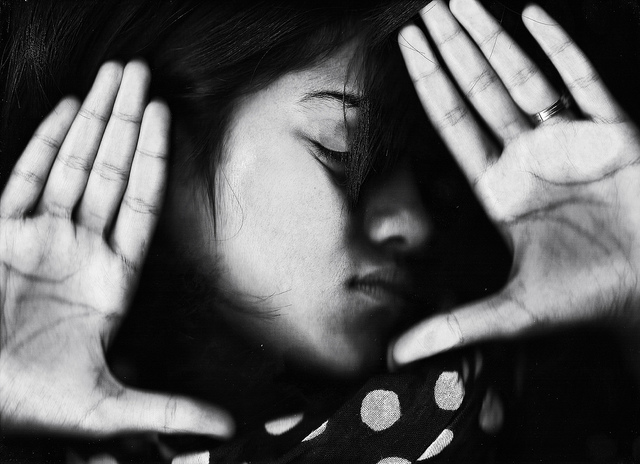
**Warning: Adult language ahead.**
“There are two kinds of suffering. There is the suffering you run away from, which follows you everywhere. And there is the suffering you face directly, and in doing so become free.” ~ Ajahn Chah
For me, rock bottom happened quietly.
If you’ve ever watched the fluff of a shedding Cottonwood tree—a fuzzy, white thing dipping and lifting like a pendulum, back and forth, up and down, even skimming across the surface of the Earth before finally coming to stillness—you would know what I mean by quietly. Like a little piece of fluff, floating in the wind, stopping and starting, it took me forever to drift all the way down—28 years to be exact.
I know it was rock bottom, because I remember the poignant moment when I understood in my soul that I either had to change myself, or let my disease win. It was one or the other. I had to do something different, or willingly surrender my whole life. That is the painful truth. There was no major event, or embarrassing moment, or catastrophic health scare to set healing in motion. In a very real sense, with half my life over, I finally and quietly came to a stop.
Addiction is a dismal, disenfranchised place. Addiction is prison.
Every day was spent in vain, trying to conquer my demons. I woke up each morning with hope and resolve, thinking “today is the day I will change everything.” But my eating disorder lived large and chaotic, and remained at the forefront of my life. As I consumed it, it consumed me, and I couldn’t let it go. Along with the daily physical torture of maintaining my bulimia, I ate, slept and breathed my shame. It continued relentlessly, habitually, and I felt powerless.
Food will always be my drug of choice. It’s how I deal with my emotions. In the trenches of my disease, I ate away resentment, remorse and conflicted feelings about my body. I stuffed down the hurtful experiences of my life, especially one particular incident that set the stage for the smoke and mirrors act I would so brilliantly perform for many years to come.
Every time I tried to bat my illness away, I would inevitably swing for the fences and miss. I would strike out and trudge back to my dugout—the dark cave of my own mind where I hid—and wallow in the misery of yet another failed attempt.
A stirring of change began when I became increasingly haunted by the concept of time passing. I woke up one morning and bitterly counted all the years I had handed over to my illness. Years I would never get back. The fact that 28 years had passed me by—filled with the daily struggle of secret behaviors I couldn’t break—was mind-numbing. How I managed to wake up every morning and think “today is the day I will turn it all around, and no one will be the wiser,” is beyond me. On the outside I still tried to be funny, available and engaging, but on the inside I hid with my monster and continued to rage. It was an exhausting facade.
Will-power is not how recovery works.
I counted the years, and let the number sink in to my core. I wrapped myself around the reality of all the time spent wasted inside self-absorption. I began to own and accept the fact that, in the clutches of my disease, I had abused my children and my husband. I had indeed damaged them in ways I am still discovering. Self-abuse abuses others. Neglect, isolation, depression, anger and moodiness was a way of life for me, but it affected my loved ones too. How could it not? I had to untangle my behaviors from their existence.
I started to imagine what real happiness might feel like. What normal would feel like.
But the monster who lived inside me won time and time again. I had no right to believe that I could slay that monster all by myself, but something within me began to change, as soon as I counted those years. I kept thinking, “Is this really how my life is meant to play out?”
I started to slowly swallow my pride, let my walls crumble, and open up. The more humble I became, the stronger I grew. And I remember making a conscious decision to just start letting some things go.
The act of releasing the desire to control everything works, if you let it.
For example, I knew I couldn’t change the volatile relationship I had with my daughter until I changed myself. I knew I couldn’t solve her problems or fight her fight. I finally came to the conclusion that I couldn’t help her at all until I helped myself. I knew these things intellectually. I knew them at the core of my being. I actively began to let go of my battle to steer the course of her life for a while. I stepped away from being a know-it-all mother and gave her some room to grow and make her own choices. I stood back and let her deal with the consequences of her own actions. I stopped giving advice and “helping” so much. I couldn’t live her life for her. My own was such a mess.
I also knew I couldn’t go back in time to change anything that happened in the past. I couldn’t go back and change certain shitty events. I couldn’t somehow relive those wasted years. I couldn’t take back the abuse, or the lies I told, or all the hours of my life I spent hunched over a toilet. I couldn’t take back my silence over what happened to me when I was just a little girl. Nothing in the past can ever be truly revisited or resolved. But, as I discovered, peace can only enter a room through an open window.
Small, steady changes tend to work, and they did. But what also worked was learning to channel my anger, remorse and resentment into resolution instead. I put the strength and energy required to harbor negativity into a positive, different determination. Out loud, to myself—and often moment to moment—I started to say, “Seriously, fuck this—I’m many things, but I am not a coward!” I started to see my bulimia as the cowardly way out of confronting my life. And that’s what finally helped me change. How I handled my emotions moving forward made each new day feel fresh. Each moment became an opportunity to do things differently.
The bottom is dark and quiet. You know you are there because the weight of what you’ve done to yourself for so many years has finally pinned you down. But the bottom, dark and quiet, is also a vast wonderland of possibility. You might not be able to see what is right in front of you, but you can feel it. Life and light swishing and whirling around you. It’s a version of hope that comes from knowing that you can not sink any deeper. There’s nowhere else to go.
Everything you did to fall to the bottom is blurry and jumbled. The points of hurt are countless, but you can see them. You can actually clearly see all the stuff that put you there. The times when you lashed out, or didn’t talk, or hid in your room. Or shut the door, or stuffed your face, jamming the food in even though your belly was full, swollen with fullness. And you can feel the violence in the thousands of moments you spent bringing it back up.
It was the punishing violence that somehow made you feel better. It is that part of your nature you recognize now. It’s the part you see clearly enough to change.
The bottom wasn’t rocky or rough. It wasn’t jagged, sharp or unforgiving—at least it wasn’t for me. The bottom was soft, and infinite and open. To tell you the truth, rock bottom was a relief. I know I was lucky to have landed so quietly. I was lucky to still have small shreds of resilience, strength, awareness and resolve. It is not lost on me that some people are not so lucky. They fall and stay down. To rise up from the bottom, not knowing where the tide will take you, requires the simple and stubborn will to live.
I knew I wanted to live. I wanted to live a different life. I didn’t know how to live, but I knew in my soul that I wanted my life.
I didn’t emerge from my 28-year fog unscathed, but I know I could have done much more damage to myself than I did. My health is a miracle. To finally come into my true self, after enduring an arduous and time-consuming secret fight, helps me appreciate what I now hold somewhat precariously in my hands: the fragile and precious jewel of a life worth living. And Lord help me, it makes me want to talk about it. My story has come out in bits and pieces in my writing. I’m writing what I know. If writing my story can help anyone feel less alone, then that is its sole purpose.
A quiet rock bottom, is still rock bottom. I know I don’t owe the world my words. I get that no one needs to know my personal, private business, and that telling it makes me vulnerable to judgement. But when I tell my story, what I’m really telling is a story with a universal theme—the truth-seeking struggle of simply being human. A story about how events, and feelings, and words, and actions, and habits and everything that ever happens to us, or everything we do to ourselves, can change the course of our life.
History changes us for the better, or it changes us for the worse.
The resilience and fighting spirit of one human being—like you or someone like me—who railed, and punched, and clawed, and tried, and began again, and again, and wept, and kept secrets without stopping for 28 years, could very well be the story of almost anyone we meet. It’s a story about rising above our reactions and changing the way we cope with the reality of our history and our future.
As it is for anyone fighting addiction, at the end of the day it is still just little, old, me acting to trip the current of the way my brain is wired. One small person, a mere piece of wayward, fuzzy fluff who sailed and dipped through the wind for years, before finally hitting a quiet rock bottom with nowhere else left to go.
Rock bottom can be a quiet place. It can be about simply mustering the courage to change. It can be as simple as finally owning our shit. Every day, it is about living left of center and doing the work required to walk our talk. It’s about telling the ugly truth and slaying the monster from one moment to the next.
Today I am fun, and funny, and filled with the gift of life and a newfound sense of purpose. But I also know I am not special. I am not entitled. I will never be perfect. And I will never be saved by anyone but myself.
In this moment, I am the girl you know—the one you’ve always known—who is running toward her life. But I’m different somehow. You know me better now. I am the girl you know who looks you in the eye.
Author: Kimberly Valzania
Image: Aditya Doshi/Flickr
Editors: Nicole Cameron; Yoli Ramazzina






Read 14 comments and reply